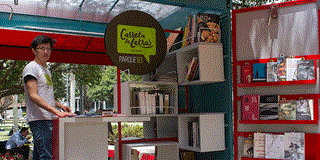Since concluding a landmark peace agreement with the FARC last year, Colombian President Juan Manuel Santos has shown visionary leadership in engaging with formerly guerrilla-controlled areas. One example is his government’s commitment to making mobile public libraries available to previously isolated, under-educated communities.
NEW YORK – In a world where the threat of large-scale war seems to increase by the day, peace treaties are rare and precious accomplishments. One of the most significant in recent history was concluded just last year, when Colombian President Juan Manuel Santos brokered an agreement between the Colombian government and the guerrillas of the Revolutionary Armed Forces of Colombia (FARC). That deal, which the Colombian government ratified last December, formally ended a 50-year civil war that claimed the lives of more than 220,000 people.
Santos was awarded the 2016 Nobel Peace Prize for his efforts. But his visionary leadership does not stop at his ability to broker and conclude an accord. As part of the Colombian government’s reconciliation program, the National Library of Colombia has made it a priority to install mobile public libraries on the outskirts of FARC demobilization zones – the areas where former guerrillas can surrender their weapons and begin to reintegrate into society.
These mobile public libraries are providing communities that have been devastated by decades of conflict with education and access to information. The parts of Colombia that were once controlled by the FARC are among the most remote and isolated in the country. Many of these communities do not have basic sanitation, power, health care, or access to education.

NEW YORK – In a world where the threat of large-scale war seems to increase by the day, peace treaties are rare and precious accomplishments. One of the most significant in recent history was concluded just last year, when Colombian President Juan Manuel Santos brokered an agreement between the Colombian government and the guerrillas of the Revolutionary Armed Forces of Colombia (FARC). That deal, which the Colombian government ratified last December, formally ended a 50-year civil war that claimed the lives of more than 220,000 people.
Santos was awarded the 2016 Nobel Peace Prize for his efforts. But his visionary leadership does not stop at his ability to broker and conclude an accord. As part of the Colombian government’s reconciliation program, the National Library of Colombia has made it a priority to install mobile public libraries on the outskirts of FARC demobilization zones – the areas where former guerrillas can surrender their weapons and begin to reintegrate into society.
These mobile public libraries are providing communities that have been devastated by decades of conflict with education and access to information. The parts of Colombia that were once controlled by the FARC are among the most remote and isolated in the country. Many of these communities do not have basic sanitation, power, health care, or access to education.